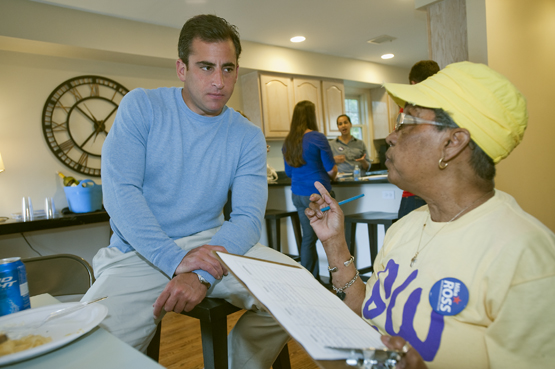Boston City Council President on the Hustings
Michael Ross wants neighborhoods — and universities — to thrive

On a warm summer evening, Michael Ross stands over a grill laden with hot dogs, hamburgers, and sausages on the deck of his Mission Hill home. Volunteers for his reelection bid to the Boston City Council are making themselves comfortable around the kitchen table.
“Welcome,” Ross calls out as more guests arrive. “Food is coming.”
The 13-member council includes 4 councilors elected by all Boston voters, and 9 district councilors, including Ross (GSM’01), who was first elected in 1999. Council president since January, he is one of four candidates with ties to BU; 3 are among the 15 running for at-large seats. He faces only one challenger, Oscar Brookins, a Northeastern University associate professor of economics, with the final election set for November 3.
“Things like this are the bread and butter of my business,” Ross says as he tops burgers with cheese. “Maintaining and growing your base is essential.”
Each Friday throughout the year, Ross holds morning coffees somewhere in his district, which includes the Back Bay, Beacon Hill, Fenway, and Mission Hill. “What I’ve found is that being accessible, being in the community, opening your door, opening your home, is essential,” he says.
Ross says his interest in public service is influenced by his father, Holocaust survivor Stephan Ross (SED’67), who was rescued by American soldiers at Dachau and has spent his career counseling Boston youth. Stephan Ross is the founder and a guiding force behind the New England Holocaust Memorial on Boston’s Freedom Trail. “I was given a gift from my father, the same gift he gave a lot of young people, about how lucky we are to live in this democracy,” Ross says. “And I guess I took it to heart.” His father met his mother, Suzanne London (SAR’79,’79), while at BU.
After graduating from Clark University, Ross landed a job at city hall as part of the team that developed Boston’s first Web site. He earned an M.B.A from BU and a law degree from Suffolk University. He’s coached Little League and soccer and works with youth groups, such as Sociedad Latina.
Ross says his BU education has informed his work as a councilor. “The program I was in spent a lot of time dealing with organization and organizational management and finance,” he says. “I think it’s important to be in government and know how to read a balance sheet.”
Among his initiatives on the city council is a zoning law, passed in 2008, that limits the number of unrelated people who can live in one apartment to four. Ross connects the growth of the city’s academic institutions to a housing shortage for residents and thus the need for such legislation.
“We failed as a city in preparing for that,” he says, “and as a result, neighborhoods fail. If you allow a house to get to a point where it becomes eight, nine people living with each other, it’ll never go back.” The new law is meant to restore balance and diversity, he says. “I think of the things we’ve done, whether it’s been improving a park or passing a recycling law or this zoning law, as strengthening our neighborhoods.”
While this initiative could be seen as antistudent, Ross says he’s worked in other ways to be supportive. He was among those pushing for the creation of the MBTA’s Night Owl program, an after-hours bus service that operated on weekends. It has since been eliminated.
He wants to make the city council more transparent by making information such as council documents, legislation, and resolutions available online. He also wants to transform Boston Common, improving its appearance, bringing in low-cost restaurants, and adding more park rangers to help prevent crime.
“A lot of people say Boston is the greatest city because we have all these hospitals and higher education institutions,” Ross says, “and these institutions do make us great. But it’s only great if all our citizens have that same feeling. My goal is that we make connections, so a young person looks outside the window and says, ‘My dad works over there, my mom works over there, and I’m going to the school down the street.’
“To me, that’s when we’ve succeeded as a city.”
Cynthia K. Buccini can be reached at cbuccini@bu.edu.
Comments & Discussion
Boston University moderates comments to facilitate an informed, substantive, civil conversation. Abusive, profane, self-promotional, misleading, incoherent or off-topic comments will be rejected. Moderators are staffed during regular business hours (EST) and can only accept comments written in English. Statistics or facts must include a citation or a link to the citation.